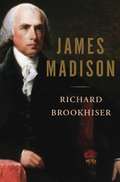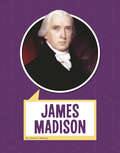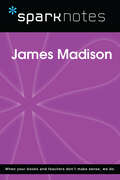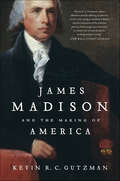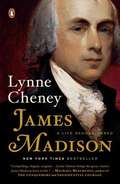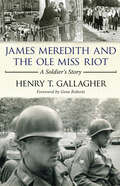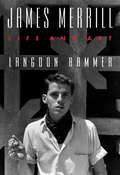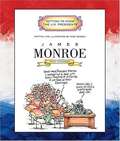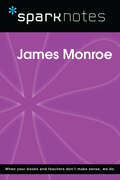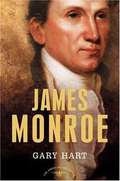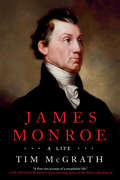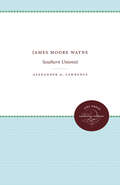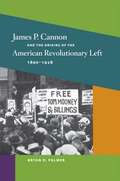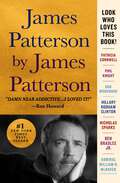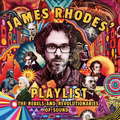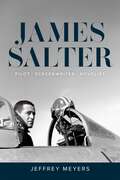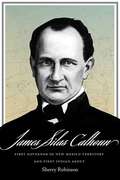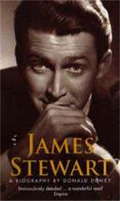- Table View
- List View
James Madison
by Richard BrookhiserJames Madison led one of the most influential and prolific lives in American history, and his story-although all too often overshadowed by his more celebrated contemporaries-is integral to that of the nation. Madison helped to shape our country as perhaps no other Founder: collaborating on the Federalist Papers and the Bill of Rights, resisting government overreach by assembling one of the nation's first political parties (the Republicans, who became today's Democrats), and taking to the battlefield during the War of 1812, becoming the last president to lead troops in combat. In this penetrating biography, eminent historian Richard Brookhiser presents a vivid portrait of the "Father of the Constitution," an accomplished yet humble statesman who nourished Americans' fledgling liberty and vigorously defended the laws that have preserved it to this day.
James Madison (Biographies)
by Laura K. MurrayHow much do you know about James Madison? Find out the facts you need to know about the fourth president of the United States. You'll learn about the early life, challenges, and major accomplishments of this important American.
James Madison (SparkNotes Biography Guide)
by SparkNotesJames Madison (SparkNotes Biography Guide) Making the reading experience fun! SparkNotes Biography Guides examine the lives of historical luminaries, from Alexander the Great to Virginia Woolf. Each biography guide includes:An examination of the historical context in which the person lived A summary of the person&’s life and achievements A glossary of important terms, people, and events An in-depth look at the key epochs in the person&’s career Study questions and essay topics A review test Suggestions for further reading Whether you&’re a student of history or just a student cramming for a history exam, SparkNotes Biography guides are a reliable, thorough, and readable resource.
James Madison and Constitutional Imperfection
by Jeremy D. BaileyThis book presents a provocative account of James Madison's political thought by focusing on Madison's lifelong encounter with the enduring problem of constitutional imperfection. In particular, it emphasizes Madison's alliance with Thomas Jefferson, liberating it from those long-standing accounts of Madisonian constitutionalism that emphasize deliberation by elites and constitutional veneration. Contrary to much of the scholarship, this book shows that Madison was aware of the limits of the inventions of political science and held a far more subtle understanding of the possibility of constitutional government than has been recognized. By repositioning Madison as closer to Jefferson and the Revolution of 1800, this book offers a reinterpretation of one of the central figures of the early republic.
James Madison and the Making of America
by Kevin R. GutzmanIn James Madison and the Making of America, historian Kevin Gutzman looks beyond the way James Madison is traditionally seen -- as "The Father of the Constitution" -- to find a more complex and sometimes contradictory portrait of this influential Founding Father and the ways in which he influenced the spirit of today's United States. Instead of an idealized portrait of Madison, Gutzman treats readers to the flesh-and-blood story of a man who often performed his founding deeds in spite of himself: Madison's fame rests on his participation in the writing of The Federalist Papers and his role in drafting the Bill of Rights and Constitution. Today, his contribution to those documents is largely misunderstood. He thought that the Bill of Rights was unnecessary and insisted that it not be included in the Constitution, a document he found entirely inadequate and predicted would soon fail. Madison helped to create the first American political party, the first party to call itself "Republican", but only after he had argued that political parties, in general, were harmful. Madison served as Secretary of State and then as President during the early years of the United States and the War of 1812; however, the American foreign policy he implemented in 1801-1817 ultimately resulted in the British burning down the Capitol and the White House. In so many ways, the contradictions both in Madison's thinking and in the way he governed foreshadowed the conflicted state of our Union now. His greatest legacy—the disestablishment of Virginia's state church and adoption of the libertarian Virginia Statute for Religious Freedom—is often omitted from discussion of his career. Yet, understanding the way in which Madison saw the relationship between the church and state is key to understanding the real man. Kevin Gutzman's James Madison and the Making of America promises to become the standard biography of our fourth President.
James Madison: A Life Reconsidered
by Lynne Cheney<P>A major new biography of the fourth president of the United States by New York Times bestselling author Lynne Cheney <P>This majestic new biography of James Madison explores the astonishing story of a man of vaunted modesty who audaciously changed the world. Among the Founding Fathers, Madison was a true genius of the early republic. <P>Outwardly reserved, Madison was the intellectual driving force behind the Constitution and crucial to its ratification. His visionary political philosophy and rationale for the union of states--so eloquently presented in The Federalist papers--helped shape the country Americans live in today. Along with Thomas Jefferson, Madison would found the first political party in the country's history--the Democratic Republicans. <P>As Jefferson's secretary of state, he managed the Louisiana Purchase, doubling the size of the United States. As president, Madison led the country in its first war under the Constitution, the War of 1812. Without precedent to guide him, he would demonstrate that a republic could defend its honor and independence--and remain a republic still. <P><b>A New York Times Bestseller</b>
James Madison: America's First Politician
by Jay CostAn intellectual biography of James Madison, arguing that he invented American politics as we know it How do you solve a problem like James Madison? The fourth president is one of the most confounding figures in early American history; his political trajectory seems almost intentionally inconsistent. He was both for and against a strong federal government. He wrote about the dangers of political parties in the Federalist Papers and then helped to found the Republican Party just a few years later. This so-called Madison problem has occupied scholars for ages. As Jay Cost shows in this incisive new biography, the underlying logic of Madison&’s seemingly mixed record comes into focus only when we understand him primarily as a working politician. Whereas other founders split their time between politics and other vocations, Madison dedicated himself singularly to the work of politics and ultimately developed it into a distinctly American idiom. He was, in short, the first American politician.
James Madison: Fourth President Of The United States
by Barbara Garland PolikoffTraces the childhood, education, employment, political career, and presidency of the statesman from Virginia.
James Meredith and the Ole Miss Riot: A Soldier's Story
by Henry T. GallagherIn September 1962, James Meredith became the first African American admitted to the University of Mississippi. A milestone in the civil rights movement, his admission triggered a riot spurred by a mob of three thousand whites from across the South and all but officially stoked by the state's segregationist authorities. Historians have called the Oxford riot nothing less than an insurrection and the worst constitutional crisis since the Civil War. The escalating conflict prompted President John F. Kennedy to send twenty thousand regular army troops, in addition to federalized Mississippi National Guard soldiers, into the civil unrest (ten thousand into the town itself) to quell rioters and restore law and order. James Meredith and the Ole Miss Riot is the memoir of one of the participants, a young army second lieutenant named Henry Gallagher, born and raised in Minnesota. His military police battalion from New Jersey deployed, without the benefit of riot-control practice or advance briefing, into a deadly civil rights confrontation. He was thereafter assigned as the officer-in-charge of Meredith's security detail at a time when he faced very real threats to his life. Gallagher's first-person account considers the performance of his fellow soldiers before and after the riot. He writes of the behavior of the white students, some of them defiant, others perceiving a Communist-inspired Kennedy conspiracy in Meredith's entry into Mississippi's “flagship” university. The author depicts the student, Meredith, a man who at times seemed disconnected with the violent reality that swirled around him, and who even aspired to be freed of his protectors so that he could just be another Ole Miss student. James Meredith and the Ole Miss Riot is both an invaluable perspective on a pivotal moment in American history and an in-depth look at a unique home front military action. From the vantage of the fiftieth anniversary of the riot, Henry T. Gallagher reveals the young man he was in the midst of one of history's most profound tests, a soldier from the Midwest encountering the powder keg of the Old South and its violent racial divisions.
James Merrill
by Langdon HammerLangdon Hammer has given us the first biography of the poet James Merrill (1926-95), whose life is surely one of the most fascinating in American literature. Merrill was born to high privilege and high expectations as the son of Charles Merrill, the charismatic cofounder of the brokerage firm Merrill Lynch, and Hellen Ingram, a muse, ally, and antagonist throughout her son's life. Wounded by his parents' bitter divorce, he was the child of a broken home, looking for repair in poetry and love. This is the story of a young man escaping, yet also reenacting, the energies and obsessions of those powerful parents. It is the story of a gay man inventing his identity against the grain of American society during the eras of the closet, gay liberation, and AIDS. Above all, it is the story of a brilliantly gifted, fiercely dedicated poet working every day to turn his life into art. After college at Amherst and a period of adventure in Europe, Merrill returned to the New York art world of the 1950s (he was friendly with W. H. Auden, Maya Deren, Truman Capote, Larry Rivers, Elizabeth Bishop, and other midcentury luminaries) and began publishing poems, plays, and novels. In 1953, he fell in love with an aspiring writer, David Jackson. They explored "boys and bars" as they made their life together in Connecticut and later in Greece and Key West. At the same time, improbably, they carried on a forty-year conversation with spirits of the Other World by means of a Ouija board. The board became a source of poetic inspiration for Merrill, culminating in his prizewinning, uncanny, one-of-a-kind work The Changing Light at Sandover. In his virtuosic poetry and in the candid letters and diaries that enrich every page of this deliciously readable life, Merrill created a prismatic art of multiple perspectives and comic self-knowledge, expressing hope for a world threatened by nuclear war and environmental catastrophe. Holding this life and art together in a complex, evolving whole, Hammer illuminates Merrill's "chronicles of love & loss" and the poignant personal journey they record.From the Hardcover edition.
James Monroe (SparkNotes Biography Guide)
by SparkNotesJames Monroe (SparkNotes Biography Guide) Making the reading experience fun! SparkNotes Biography Guides examine the lives of historical luminaries, from Alexander the Great to Virginia Woolf. Each biography guide includes:An examination of the historical context in which the person lived A summary of the person&’s life and achievements A glossary of important terms, people, and events An in-depth look at the key epochs in the person&’s career Study questions and essay topics A review test Suggestions for further reading Whether you&’re a student of history or just a student cramming for a history exam, SparkNotes Biography guides are a reliable, thorough, and readable resource.
James Monroe (The American Presidents Series)
by Gary HartThe actions and priorities of James Monroe are portrayed here. He is described as a president ahead of his time whose priority in setting up America's national security has a great deal in common with chief executives of our own time.
James Monroe: 5th President Of The United States
by Rebecca StefoffProfiles the early life, career, family, and contributions of the fifth president of the United States.
James Monroe: A Life
by Tim McGrathThe extraordinary life of James Monroe: soldier, senator, diplomat, and the last Founding Father to hold the presidency, a man who helped transform thirteen colonies into a vibrant and mighty republic.&“A first-rate account of a remarkable life.&”—Jon Meacham, Pulitzer Prize-winning author of The Soul of America Monroe lived a life defined by revolutions. From the battlefields of the War for Independence, to his ambassadorship in Paris in the days of the guillotine, to his own role in the creation of Congress's partisan divide, he was a man who embodied the restless spirit of the age. He was never one to back down from a fight, whether it be with Alexander Hamilton, with whom he nearly engaged in a duel (prevented, ironically, by Aaron Burr), or George Washington, his hero turned political opponent. This magnificent new biography vividly recreates the epic sweep of Monroe&’s life: his near-death wounding at Trenton and a brutal winter at Valley Forge; his pivotal negotiations with France over the Louisiana Purchase; his deep, complex friendships with Thomas Jefferson and James Madison; his valiant leadership when the British ransacked the nation&’s capital and burned down the Executive Mansion; and Monroe&’s lifelong struggle to reckon with his own complicity in slavery. Elected the fifth president of the United States in 1816, this fiercest of partisans sought to bridge divisions and sow unity, calming turbulent political seas and inheriting Washington's mantle of placing country above party. Over his two terms, Monroe transformed the nation, strengthening American power both at home and abroad. Critically-acclaimed author Tim McGrath has consulted an extensive array of primary sources, many rarely seen since Monroe's own time, to conjure up this fascinating portrait of an essential American statesman and president.
James Moore Wayne: Southern Unionist
by Alexander A. LawrenceSouthern aristocrat, mayor of Savannah, congressman for three terms, justice of the Supreme Court of the United States, James Moore Wayne made love of the federal union the governing principle of his political and judicial career. Here is shown the impact of this southern unionist upon the Supreme Court during the critical period from 1835 to 1867.Originally published in 1943.A UNC Press Enduring Edition -- UNC Press Enduring Editions use the latest in digital technology to make available again books from our distinguished backlist that were previously out of print. These editions are published unaltered from the original, and are presented in affordable paperback formats, bringing readers both historical and cultural value.
James Nasmyth: Engineer - an Autobiography
by Samuel Smiles James NasmythAutobiography of the mechanical inventor
James Otis the Pre-revolutionist
by John Clark RidpathTHE LIFE OF AN IMPORTANT BUT NEGLECTED PARTICIPANT IN THE aMERICAN REVOLUTION.
James P. Cannon and the Origins of the American Revolutionary Left, 1890-1928 (The Working Class in American History)
by Bryan D. PalmerBryan D. Palmer's award-winning study of James P. Cannon's early years (1890-1928) details how the life of a Wobbly hobo agitator gave way to leadership in the emerging communist underground of the 1919 era. This historical drama unfolds alongside the life experiences of a native son of United States radicalism, the narrative moving from Rosedale, Kansas to Chicago, New York, and Moscow. Written with panache, Palmer's richly detailed book situates American communism's formative decade of the 1920s in the dynamics of a specific political and economic context. Our understanding of the indigenous currents of the American revolutionary left is widened, just as appreciation of the complex nature of its interaction with international forces is deepened.
James Patterson by James Patterson: The Stories of My Life
by James PattersonHow did a kid whose dad lived in the poorhouse become the most successful storyteller in the world? This "fizzing, funny, often deeply moving" (Daily Mail) #1 New York Times bestselling memoir is &“damn near addictive. I loved it . . . that Patterson guy can write!&” (Ron Howard) On the morning he was born, he nearly died. His dad grew up in the Pogey– the Newburgh, New York, poorhouse. He worked at a mental hospital in Massachusetts, where he met the singer James Taylor and the poet Robert Lowell. While he toiled in advertising hell, James wrote the ad jingle line &“I&’m a Toys &‘R&’ Us Kid.&” He once watched James Baldwin and Norman Mailer square off to trade punches at a party. He&’s only been in love twice. Both times are amazing. Dolly Parton once sang &“Happy Birthday&” to James over the phone. She calls him J.J., for Jimmy James. How did a boy from small-town New York become the world&’s most successful writer? How does he do it? He has always wanted to write the kind of novel that would be read and reread so many times that the binding breaks and the book literally falls apart. As he says, &“I&’m still working on that one.&”
James Rhodes' Playlist: The Rebels and Revolutionaries of Sound
by James RhodesA visually stunning introduction to classical music from piano maestro and bestselling author James Rhodes."Rhodes makes classical music accessible, relatable, and exciting. It is hard not to be swept up - Rhodes writes with such enthusiasm and thoughtfulness that readers will be dying to listen to the Spotify playlist he shares ... Rhodes makes history and music come alive. Surreal, psychedelic collages ... make the book an eye-popping visual experience as well. A dynamic and infectious introduction to classical music." - Kirkus Bach. Mozart. Beethoven. Old guys with curly wigs, right? But trust me: those composers were the original rock stars. Let me introduce you to some of the most breathtaking and magnificent pieces of music ever created. We'll meet the rebels and revolutionaries who wrote them - did you know Beethoven peed into a chamber pot he kept under his piano? - and find out why they're responsible for every track on your phone today. The world of classical music is going to blow your mind. So take some time out to listen to the online playlist I've curated for you as you read. Bach, Mozart, Beethoven, Chopin, Schubert, Rachmaninoff and Ravel: the perfect introduction to classical music.With jaw-dropping artwork and avant-garde design, this visually exquisite celebration of classical music is encased in a stunning slipcase and features a large fold-out poster as well as an accompanying online playlist of the pieces being discussed. It's the perfect gift for older children and adults alike who want to explore classical music, but aren't quite sure where to begin.
James Russell Lowell
by Martin DubermanBiography of James Russell Lowell (1819-1891): poet, critic, editor, teacher, diplomat, friend of freedom and a man of warmth, wit and integrity. This biography by noted historian Martin Duberman, was a finalist for the 1967 National Book Award for History and Biography.
James Salter: Pilot, Screenwriter, Novelist
by Jeffrey MeyersBiographer and critic Jeffrey Meyers knew the novelist James Salter (1925–2015) during the last decade of his life, visited him twice on Long Island, and received eighty letters from him. Meyers’s knowledge of Salter’s life provides many new insights about the personal, literary, and historical background of his work. This appreciative book, the first full-length study in twenty-six years, is intended to introduce Salter to new readers and show his achievement as a writer of novels, stories, screenplays, memoirs, and travel essays. Salter had an extraordinary range of experience as West Point graduate; fighter pilot in the Korean War; downhill skier, rock climber, and mountain climber; screenwriter and film director; connoisseur of food and wine; world traveler and sophisticated observer. In an elegant blend of literary criticism and intimate memoir, with crisp prose and an eye for telling detail, Meyers discusses Salter’s family and friends; the significance of his book and chapter titles; characters’ names and cultural allusions; literary influences, especially Ernest Hemingway and F. Scott Fitzgerald; development of his fictional style and techniques; awareness of weather and light; supreme delineation of sexual ecstasy; recurrent themes of war and love; strange career and late recognition. A detailed chronology tracks the key dates and events in Salter’s life, and a chronological bibliography shows the development of his literary reputation. For Meyers, Salter’s lyrical evocation of people and places, of luxurious decadence and the danger of death, are unsurpassed in contemporary literature. This book appears just before the centenary of Salter’s birth.
James Silas Calhoun: First Governor of New Mexico Territory and First Indian Agent
by Sherry RobinsonVeteran journalist and author Sherry Robinson presents readers with the first full biography of New Mexico&’s first territorial governor, James Silas Calhoun. Robinson explores Calhoun&’s early life in Georgia and his military service in the Mexican War and how they led him west. Through exhaustive research Robinson shares Calhoun&’s story of arriving in New Mexico in 1849—a turbulent time in the region—to serve as its first Indian agent. Inhabitants were struggling to determine where their allegiances lay; they had historic and cultural ties with Mexico, but the United States offered an abundance of possibilities.An accomplished attorney, judge, legislator, and businessman and an experienced speaker and negotiator who spoke Spanish, Calhoun was uniquely qualified to serve as the first territorial governor only eighteen months into his service. While his time on the New Mexico political scene was brief, he served with passion, intelligence, and goodwill, making him one of the most intriguing political figures in the history of New Mexico.
James Stewart
by Donald DeweyIn this penetrating and riveting biography of one of Hollywood's most beloved screen icons, Donald Dewey probes beneath Jimmy Stewart, the conservative image and ideal, to reveal James Stewart, the actor and the man. Through hundreds of interviews and in-depth analysis of his seventy-five films, the author assesses how the Hollywood man-about-town of the 1930's and 40's - Stewart's lovers included Ginger Rogers, Olivia de Havilland and Marlene Dietrich - became the epitome of American family values who remained married for forty-five years; and how the studio-bred, effervescent star of It's a Wonderful Life developed into the brilliant actor whose performances in films such as Vertigo and Shenandoah exposed a vulnerability unseen in his personal relationships. With many insights into the turmoil of his private life, the artistry behind his cinematic craft and his heroic military record in the Second World War, Dewey gives us much more than a legend to love.
